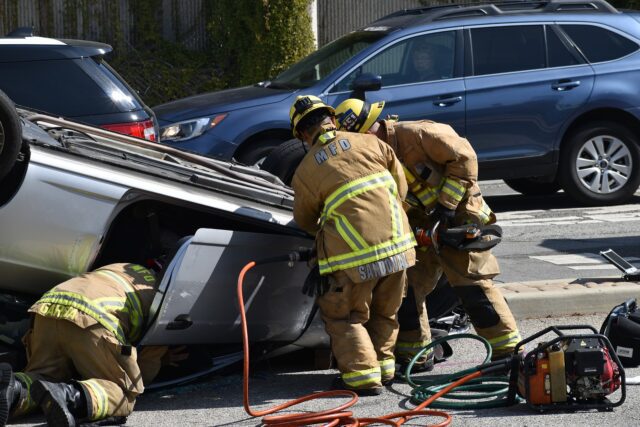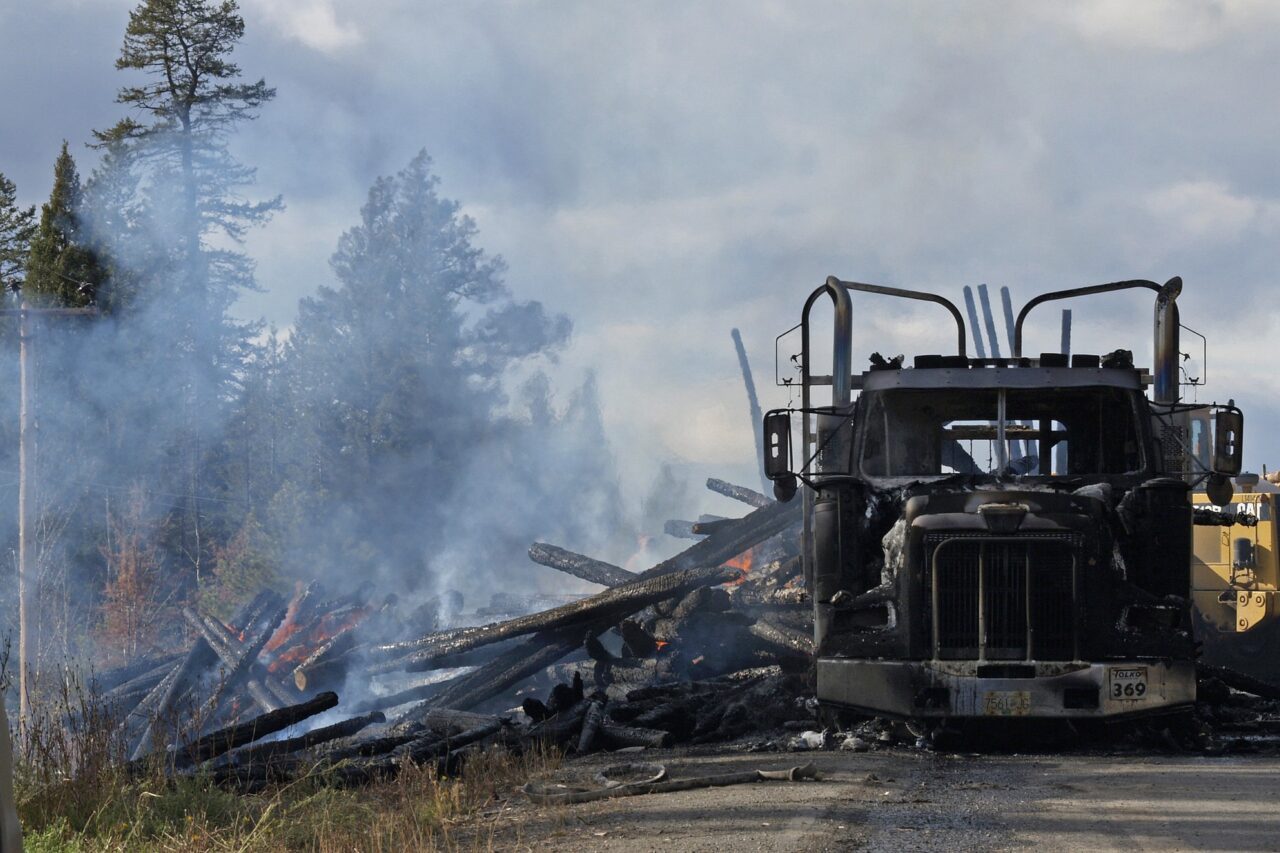Commercial Truck Accident Attorney in Denver, Colorado
Thousands of large trucks and semi-tractor trailers pass through the state of Colorado each year. Due to the size and weight difference of these large vehicles, when the 18-wheelers or large commercial trucks cross paths with smaller passenger vehicles or motorcycles, the resulting injuries are often severe and even fatal.
At Rocky Mountain Personal Injury Lawyers, our attorneys strive to hold negligent truck drivers and other parties — including employers who negligently hire or retain dangerous drivers — accountable for the injuries or death that occurred as a result of the truck driver’s negligence. Our team has years of experience serving clients in commercial trucking accident personal injury cases, and we understand the particular ins and outs of commercial trucking regulations and compliance.
If you or your loved one has been injured in a commercial vehicle accident, it is very important to quickly contact an experienced personal injury lawyer in Denver to discuss the facts surrounding your case.
Why are Commercial Truck Accidents Common in Colorado?
Given the centrality of Colorado’s location within the nation, it finds itself on many North-South and East-West routes, placing it at the heart of United States commerce. Consequently, you’re likely to see significantly more big trucks out your window than you would in many other parts of the country, especially on one of our many highways. Pair that with often icy road conditions, winding roads, and steep descents, and you have a pretty dangerous situation for both commercial truck drivers and the cars with which they share the road.
Interstate 70, in particular, is a major artery connecting the Mid-Atlantic to the Mountain West, transporting hundreds of thousands of shipping pallets ranging from last night’s Amazon Prime order to at-home COVID test kits. Moreover, outdoor recreation enthusiasts flock to Colorado’s I-70 corridor to enjoy mountain pastimes like skiing, hiking, and mountain biking. Whether you’re a local or visiting from out of town, you’ve likely experienced rage-inducing traffic – elongating just over an hour of transit into several hours from Point A in the mountains to Point B in Denver.
Whether your journey home goes off without a hitch, or the mass powder day exodus on I-70 leaves you questioning your sanity as you idle in the Eisenhower Tunnel for 40 minutes, you will doubtless feel a sense of relief as you descend into the Front Range plains from the foothills in Golden and Morrison. Expansive views of the greater Denver area aside, I-70 E in Lakewood is notorious for its steep descent, dropping roughly 2,000 feet over a handful of miles. Steep grades coupled with a certain reckless abandon stemming from the feeling I’m Almost Home are a recipe for hasty driving and constant brake-checks.
When you couple these chaotic conditions and distracting views with the high volume of big trucks on the road, accidents are bound to happen.

Causes of Commercial Truck Negligence Accidents in Denver, Colorado
As with accidents involving standard passenger vehicles, the causes for these accidents are numerous. However, truck accidents typically fall into one of the following categories:
- Truck driver error- This can mean a myriad of things. Speeding, failure to yield, distracted driving, illegal turning, and swerving into other lanes are all considered to be a driver error.
- Violation of federal rules- Just like you have to follow driving laws when you get behind the wheel of your car, truck drivers have their own set of federally determined regulations that they must follow in addition to the traffic laws you know. As truck accident attorneys, we know these laws and how to prove whether they were followed.
- Maintenance and loading failure- It is the responsibility of the truck drivers and trucking companies to ensure that their vehicle is safe to operate. Overloading or improper loading can cause the trailers to move in ways they are not designed to, which can often cause these accidents. Similarly, bad brakes, tire blowouts, or any other equipment failure can occur from improper maintenance of the vehicle.
“Steep Grade Ahead” signage on major mountain roadways like I-70 encourages drivers to downshift and avoid overheating their brakes. Many ignore the signs and careen down the highway anyhow. Added stress on a vehicle’s brakes causes wear-and-tear and may have perilous consequences. If you have ever smelled burning rubber as you near Denver from the west, it is likely due to over-braking.
Burning rubber is the most common symptom of scorching brakes, but it is far from the most lethal. Harkening back to Lakewood’s mesmerizing view of Denver from the foothills, the very same stretch of highway emblematic of returning home played host to an infamous Colorado highway tragedy. At its core, failing brakes and an ill-prepared driver led to a catastrophic crash.
Rogel Aguilera-Mederos: A Commercial Truck Accident Case Study
Rogel Aguilera-Mederos, a 25-year-old semi-truck operator, was convicted of vehicular homicide and sentenced to 110 years in prison after losing control of his truck and plowing into traffic on I-70 Eastbound in Lakewood, Colorado. Aguiliera-Mederos was hauling lumber when his brakes failed, culminating in a multi-vehicle pileup and four deaths. The chain-reaction collision ruptured gas tanks and sparked a fireball, melting portions of the highway and consuming vehicles in its wake.
Upon review of closing arguments, state prosecutors argued Aguiliera-Mederos’s actions constituted “extreme indifference to human life” insofar as he failed to seek an inspection prior to the job and disregarded runaway ramps alongside the interstate (Aguiliera-Mederos admitted he closed his eyes when he lost control of the truck during testimony). Furthermore, Aguiliera-Mederos falsified prior experience as a commercial driver and lacked the necessary experience to thwart calamity and divert off the interstate. As damning as the evidence may appear, Aguiliera-Mederos had no prior criminal record, and the 110 year sentence was the “mandatory minimum term required under state law”, according to the judge presiding over the matter.
The Problem with Mandatory Minimum Sentences
Ann England, a professor at CU Law, asserts mandatory minimum sentences strip discretion and nuance from the courts and shift the balance of power from the court to the prosecutor. In other words, it infringes on judges’ ability to adjudicate cases on their merits. In that spirit, Judge Bruce Jones (who presided over Aguiliera-Mederos’s case) went on-record stating, “if I had the discretion, it would not be my sentence.”
Mandatory minimum sentences’ binding effect on Colorado jurisprudence sparked international criticism, and 4.5 million individuals signed a petition calling for Colorado governor Jared Polis to grant clemency to Aguiliera-Mederos or commute his sentence. Now is an appropriate time to review the term ‘clemency’ and what it means to commute a sentence. Finding our definition requires a brief sojourn to the United States Constitution.
The Law in Action
According to Article II, Section 2, Clause 1, the President “shall have Power to grant Reprieves and Pardons for Offenses against the United States.” Clemency – meaning leniency or mercy – is a shorthand for the above clause, enshrining the power of the President or a State Governor to pardon a criminal or commute a sentence.
Pertaining to Mr. Aguiliera-Mederos’s case, Governor Polis commuted his 110-year sentence down to 10 years in late 2021. Polis’s actions doubtless correct an unjust sentencing and offer a crucial reminder of the power ordinary people wield to effectuate change and right wrongs.
Nevertheless, Colorado’s mandatory minimum sentencing requirements persist despite staunch criticism across the country. Polis’s intervention begs the question whether countless other Coloradans involved in less high-profile cases suffer unjust rulings due to mandatory requirements beyond Colorado judges’ control.

What to Do After a Denver Commercial Truck Accident
After any crash involving a commercial truck, the victims should immediately contact authorities to report the accident and seek medical treatment for their injuries. Even if you feel okay, remember that many serious injuries do not always display immediate symptoms.
You also need to document the scene. Be sure to take detailed photographs of the accident before leaving the area.
Perhaps most importantly, you should be very careful when dealing with insurance representatives for the truck. Insurance companies will often send agents to the crash scene, and they will attempt to get victims to sign seemingly innocent paperwork that actually results in significant rights being forfeited.
As soon as you are able to, be sure to contact an experienced truck accident attorney in Denver, Colorado, for assistance dealing with these trucking and insurance companies.
Semi-Truck drivers are beholden to the same “Rules of the Road” as everyone else. If you encounter a reckless truck driver, (think swerving on an ice-laden highway, or worse yet, failed brakes) do not hesitate to contact Rocky Mountain Personal Injury Lawyers.
RMPIL specializes in semi-truck accident personal injury cases. We are the Lawyers Who Listen, and we would be honored to schedule a free consultation at your earliest convenience.


